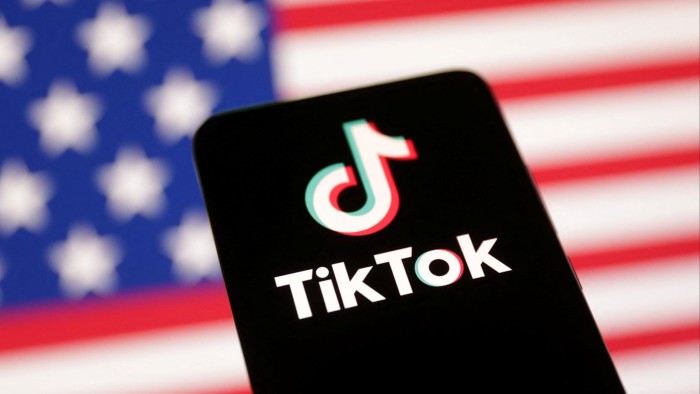Unlock the White House Watch newsletter for free
Your guide to what the 2024 US election means for Washington and the world
Donald Trump said he would sign an executive order extending the deadline for ByteDance, the Chinese owner of TikTok, to divest the popular video-sharing app’s US business and avoid a nationwide ban in America.
The US president said on his Truth Social platform on Friday he would push back the deadline, which had been Saturday, by 75 days, adding the extension was designed to allow American companies trying to acquire TikTok more time to finalise a deal.
“The Deal requires more work to ensure all necessary approvals are signed, which is why I am signing an Executive Order to keep TikTok up and running for an additional 75 days,” Trump wrote.
Under a law passed by Congress last year, ByteDance had until January 19 to divest TikTok to non-Chinese entities, but that month Trump issued an order extending the deadline by 90 days. His latest order extends the deadline by another 75 days.
The White House was this week close to establishing the parameters of a deal with US investors, although it would have needed more time to be fully executed, and approval from Beijing, according to people familiar with the matter.
However, the process was derailed by Trump’s tariffs announcement, the people said. China would now seek to negotiate on tariffs before granting any approval, one of the people said. It is unclear if Beijing engaged in talks over the deal.
A ByteDance spokesperson said in a statement: “ByteDance has been in discussion with the US government regarding a potential solution for TikTok US. An agreement has not been executed. There are key matters to be resolved. Any agreement will be subject to approval under Chinese law.”
Trump said he hoped to “continue working in Good Faith with China”, which he added was unhappy with duties he imposed on imports of Chinese goods on Wednesday as part of his “reciprocal tariffs”. China on Friday retaliated with a 34 per cent tariff on imports from the US.
It is also unclear if Beijing will allow a divestment or let a US group secure control of the app’s algorithm.
“We do not want TikTok to ‘go dark’,” Trump added. “We look forward to working with TikTok and China to close the Deal.”
Trump suggested earlier this week he could reduce tariffs on Chinese goods in exchange for Beijing allowing ByteDance to divest TikTok.
The president has been forced to balance the security concerns that are core to the US TikTok legislation — which have long been raised by China hawks in Congress — and the huge support for the video-sharing app among younger users and his own success on the platform.
TikTok did not immediately respond to a request for comment.
Alison Szalwinski, vice-president at The Asia Group, a consultancy, said any extension to the deadline would likely concern companies that offer cloud and app store services to TikTok, such as Apple, Google and Oracle for legal reasons.
Without a sale of TikTok, companies that distribute or host the app risk a fine of $5,000 per user, according to the legislation. “Companies are going to continue to be quite anxious,” Szalwinski said.
The White House has been weighing a proposal to spin off TikTok from ByteDance that would create a new US company that would receive fresh American investment to dilute the ownership stakes of Chinese investors, people familiar with the matter told the Financial Times earlier this week.
Under the terms of the proposal, a group of new investors including Andreessen Horowitz, Blackstone, Silver Lake and other big private capital groups would own about half of TikTok’s US business, the people said.
These people added large existing investors in TikTok — including General Atlantic, Susquehanna, KKR and Coatue — would hold 30 per cent of the new US business.
ByteDance would retain a stake at just below 20 per cent, which would satisfy a requirement in the TikTok legislation that no more than a fifth of the company be controlled by a “foreign adversary”.
One crucial issue is who would control TikTok’s sought-after algorithm. One option under discussion involves ByteDance continuing to develop and operate the algorithm, which has been a central demand of China’s government, while the new US group could access it through a licensing agreement.
But that could spark concern on Capitol Hill where many lawmakers insist China does not have control over the algorithm.
The Republican lawmakers on the House China committee, which was instrumental in passing the TikTok legislation, on Friday said any deal must ensure that US law is followed, and that the Chinese Communist party “does not have access to American user data”.

